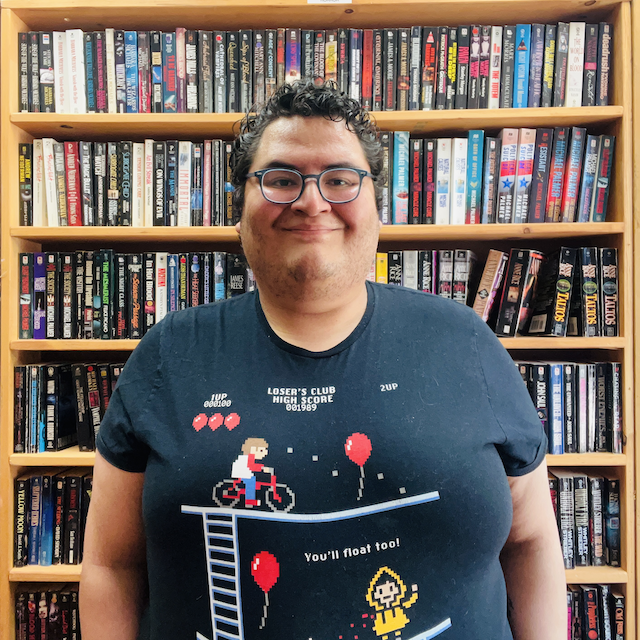Professor Juan "Ricky" Araiza
About

Pronouns: he/him
Education Overview & Bio
Juan “Ricky” Araiza (he/him), a Las Cruces resident since 2014, received his Bachelor’s degree in Literature, Language, and Culture w/ Minor in Creative Writing from New Mexico State University in 2018 then his Master’s degree in Literature w/ Minor in Gender & Sexuality Studies during the height of the COVID-19 pandemic in 2020.
As an instructor at New Mexico State University (Gender & Sexuality Studies; English) and Dona Ana Community College (English), his courses and curriculums are structured around the study and development of writing, rhetoric, and composition at the collegiate level through the use of genre study and analysis as well as interdisciplinary writing practices, exercises, and assignments. Here, students build upon and affirm their unique, personal knowledgebases while simultaneously developing their skills as academics and scholars capable of deep, critical thinking, analysis, writing, rhetoric, and composition.
Current Courses:
ENGL 1410G: Introduction to Literature
GNDR 2110G: Introduction to Women, Gender & Sexuality Studies
ENGL 2221G: Writing in the Humanities & Social Sciences: Imagined Possibilities: Science Fiction, Society, & the Self
ENGL 2520G: Film as Literature
Previous Courses:
ENGL 111G: Rhetoric and Composition
ENGL 2221G: Intersectionality & Horror; Graphic Narratives: Comics as Literature
GNDR 360/550: Masculinities Studies
Teaching interests
- Critical Queer, Race, & Feminist Theory and Literature
- Narrative, Medium, & Cultural Studies
- Global Feminism, Film, & Cinema Studies; Intersectionality and Speculative Fiction Genre Studies & Theory (Fantasy, Science Fiction, & Horror)
- Intersectional Analysis and the Disruption of Racism, Misogyny, & Queerphobia
- Literary, Creative, and Critical Studies as Rhetoric, Composition, & Writing
- Creative Arts and the Learning Process
Key Research Topics or Projects
- Comics as Cultural Literary Medium and Pedagogical Tools for Rhetoric and Composition
- Storytelling as Personal & Social Tools of Expression, Creativity, and Reflection
- The Academic Analysis & Discussion of Pulp and Speculative Fiction
- Interdisciplinary Practices of Pedagogy, Writing, and Rhetoric
- Archives and the Canonization of Mainstream Media and Popular Culture
- Speculative Fiction and the Literary Imagination of Western Hegemony
- Horror, Survival, and Other Stories of Hope
- Sci-Fi Reflections on the Human Condition and Utopia as Dystopia
- Fantasy, Fairy Tales, Fables, and the Literary Battles of Good & Evil
- The Coming-of-Age Formula in Children and Young Adult’s Literature, Animation, & Cartoons
Creative Interests and/or Community Engagement & Advocacy
- Queer, Fat, and Latinx Representation, Theory, & Aesthetics in the Arts, Social Sciences, & Humanities
- Comics and Zines as Visual Tools of Resistance, Advocacy, & Awareness
- “Queerative” Praxis and Methods of Learning, Creating, & Building Community
- Visual Storytelling & Cultural Effects
- Videogames as Literature and Other Narrative Technologies
- Surrealism & Magical Realism as Language, Experience, and Memoir
Creative Practices in Written and Digital/Visual Mediums: Comics & Zines, Poetry, and Creative Prose
- Selected Project: (Ventanas – Made for and by horror fans looking to center marginalized voices. (dinmagazine.org)
As an editor, I helped curate, organize, publish, and promote Ventanas, a 2018 digital/web zine publication put together by students from NMSU’s Main Campus English Department’s Online Publication course. Ventanas, Spanish for “windows,” is made by horror fans for horror fans looking to center marginalize voices, authors, narratives, perspectives, and imaginations through various creative forms of expressions both academic and artistic. It is a southwestern publication made up of horror fans looking to legitimize the genre as a “window” that allows us to view, express, and reflect upon our societal fears and anxieties. We want to push the boundaries of what is considered “horrific” and “truly” scary within our current world and rescue the horror genre from its mainstream conditions of whiteness and heterosexuality/normativity so that it can be pulled apart to expose the tensions with that often go ignored. That being said, issues/topics that we are particularly interested in exploring are (but not limited to) race, gender, sex/sexuality, class, identity, civil/human rights, “otherness”,” and many more.
